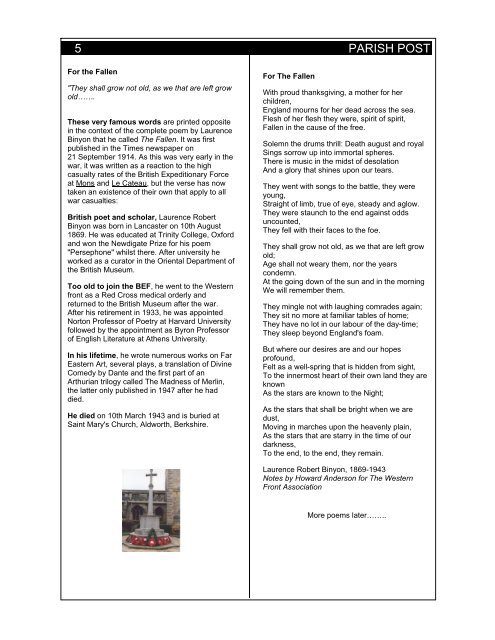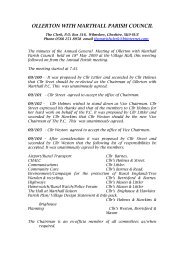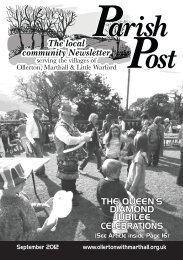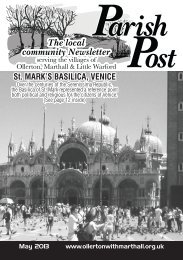AJ Walley - Ollerton with Marthall
AJ Walley - Ollerton with Marthall
AJ Walley - Ollerton with Marthall
Create successful ePaper yourself
Turn your PDF publications into a flip-book with our unique Google optimized e-Paper software.
5 PARISH POST<br />
For the Fallen<br />
"They shall grow not old, as we that are left grow<br />
old…….<br />
These very famous words are printed opposite<br />
in the context of the complete poem by Laurence<br />
Binyon that he called The Fallen. It was first<br />
published in the Times newspaper on<br />
21 September 1914. As this was very early in the<br />
war, it was written as a reaction to the high<br />
casualty rates of the British Expeditionary Force<br />
at Mons and Le Cateau, but the verse has now<br />
taken an existence of their own that apply to all<br />
war casualties:<br />
British poet and scholar, Laurence Robert<br />
Binyon was born in Lancaster on 10th August<br />
1869. He was educated at Trinity College, Oxford<br />
and won the Newdigate Prize for his poem<br />
"Persephone" whilst there. After university he<br />
worked as a curator in the Oriental Department of<br />
the British Museum.<br />
Too old to join the BEF, he went to the Western<br />
front as a Red Cross medical orderly and<br />
returned to the British Museum after the war.<br />
After his retirement in 1933, he was appointed<br />
Norton Professor of Poetry at Harvard University<br />
followed by the appointment as Byron Professor<br />
of English Literature at Athens University.<br />
In his lifetime, he wrote numerous works on Far<br />
Eastern Art, several plays, a translation of Divine<br />
Comedy by Dante and the first part of an<br />
Arthurian trilogy called The Madness of Merlin,<br />
the latter only published in 1947 after he had<br />
died.<br />
He died on 10th March 1943 and is buried at<br />
Saint Mary's Church, Aldworth, Berkshire.<br />
For The Fallen<br />
With proud thanksgiving, a mother for her<br />
children,<br />
England mourns for her dead across the sea.<br />
Flesh of her flesh they were, spirit of spirit,<br />
Fallen in the cause of the free.<br />
Solemn the drums thrill: Death august and royal<br />
Sings sorrow up into immortal spheres.<br />
There is music in the midst of desolation<br />
And a glory that shines upon our tears.<br />
They went <strong>with</strong> songs to the battle, they were<br />
young,<br />
Straight of limb, true of eye, steady and aglow.<br />
They were staunch to the end against odds<br />
uncounted,<br />
They fell <strong>with</strong> their faces to the foe.<br />
They shall grow not old, as we that are left grow<br />
old;<br />
Age shall not weary them, nor the years<br />
condemn.<br />
At the going down of the sun and in the morning<br />
We will remember them.<br />
They mingle not <strong>with</strong> laughing comrades again;<br />
They sit no more at familiar tables of home;<br />
They have no lot in our labour of the day-time;<br />
They sleep beyond England's foam.<br />
But where our desires are and our hopes<br />
profound,<br />
Felt as a well-spring that is hidden from sight,<br />
To the innermost heart of their own land they are<br />
known<br />
As the stars are known to the Night;<br />
As the stars that shall be bright when we are<br />
dust,<br />
Moving in marches upon the heavenly plain,<br />
As the stars that are starry in the time of our<br />
darkness,<br />
To the end, to the end, they remain.<br />
Laurence Robert Binyon, 1869-1943<br />
Notes by Howard Anderson for The Western<br />
Front Association<br />
More poems later……..








